1941: Joe DiMaggio's Hitting Streak: Games 27-42
Game 27 - Saturday, June 14, 1941
A big crowd of 44,161 welcomed the Yankees home against the Cleveland Indians and their ace, Rapid Robert Feller.
- Bob had beaten the Yanks twice in 1941. However, DiMaggio tended to do well against the 22-year-old fireballer.
- New York took a 1-0 lead in the first on Tommy Henrich's seventh HR in two weeks since borrowing DiMaggio's old bat. Joe came up next and walked.
- DiMag strode to the plate in the third with two on and two out. Some hitters adjusted their stance for Feller, but Joe dug in the same for every hurler - feet wide apart, right foot on the back line of the box.
- With the count 3 and 0, Joe slammed a liner into RCF for a double scoring Rolfe and sending Henrich to third. 27 in a row!
- Joe ended the day 1-for-2 as the Yanks gained a game on the Indians, 4-1 behind Atley Donald's three-hitter.
In Beantown, the White Sox scored four in the eighth to beat the Red Sox, 5-2.
- Ted Williams smacked a double and two singles in five official ABs. However, he neither scored nor drove in a run.
- That performance raised his average to .416.
Reference: 56: Joe DiMaggio and the Last Magic Number in Sports, Kostya Kennedy (2011) |
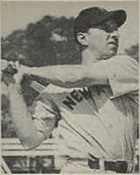
Tommy Henrich
|
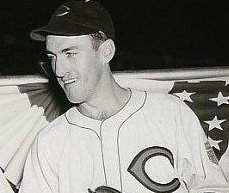
James Bagby Jr.
|
Game 28 - Sunday, June 15, 1941
Almost as many showed up on Sunday, 43,962, as on Saturday, 44,161. They saw the Yankees chip another game off Cleveland's lead.
- The game was the fastest at the Stadium so far that season - 1 hour, 45 minutes.
- Red Ruffing threw a complete game six-hitter to make his record 7-3.
- DiMaggio clobbered a Jim Bagby pitch into the upper deck in LF to contribute to the 3-2 victory. It was his only hit in three official ABs with a walk.
- Joe was only one game from tying what was thought to be the Yankee record of 29 straight set in 1919 by SS Roger Peckinpaugh and tied 12 years later by CF Earle Combs.
- Later research revealed that 1B Hal Chase had run off a 33-game hitting streak for the club in 1907.
The Red Sox swept a doubleheader from the White Sox at Fenway Park.
- In the opener, an 8-6 victory, Williams had two singles in three ABs, scoring two runs and driving in another. He also drew a walk.
- The nightcap produced another two-run win, 6-4, to the delight of the crowd of 34,500. Ted had a homer, a double, and a walk in three ABs.
- He gained nine points on his average to .425.
|
Game 29 - Monday, June 16, 1941
The Yankees completed the sweep of the reeling Indians, 6-4, to pull within one game of the Tribe.
- The umpires suspended play after the fourth inning because of rain with the score tied at 3. DiMaggio was 0-for-2 at that point against lefty Al Milnar, who had pitched Game 17 of Joe's streak.
- When play resumed, Joe doubled in the fifth. The 12,552 fans, a good attendance for a Monday afternoon, applauded their CF for tying what was believed to be the club record hitting streak.
- Trailing 4-3, the Bombers plated three in the eighth with two out to stun Roger Peckinpaugh's club. Joe finished 1-for-5.
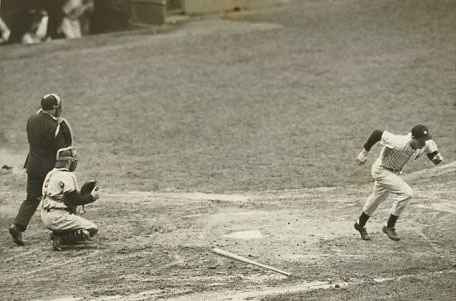
DiMaggio just after extending The Streak to 29 games
The Red Sox had the day off after their doubleheader on Sunday.
Major event that day: John Golden celebrated his 37th birthday in Jackson MS as he awaited the birth of his second child.
|
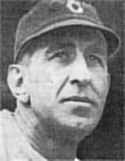
Roger Peckinpaugh
Back to Top |

Luke Appling
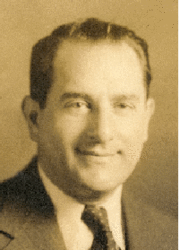
Dan Daniel
|
Game 30 - Tuesday, June 17, 1941
The Chicago White Sox began a three game series at the Stadium.
- The visitors ended the Yankees eight-game winning streak, 8-7.
- DiMaggio got only one hit for the fourth game in a row. It would prove to be the most controversial hit in the streak.
- When Joe came to the plate in the seventh, he was hitless and NY trailed 7-2. This might be his last at-bat of the contest. He faced Johnny Rigney, pitching his third game during the streak and making his last start before induction into the army. (As it turned out, Johnny flunked his physical when the doctors discovered a perforated ear drum.)
- Joe slashed a hard grounder that kicked up and hit SS Luke Appling on the shoulder. With Joe safely on first, the official scorer, Dan Daniel of the New York World-Telegram - an open admirer of DiMaggio, had a tough decision. Since Dan was sitting admidst his fellow reporters in the press box, they all looked to him. John Drebinger of The New York Times, sitting next to Daniel, relieved the tension. "Looked like a hit to me. Dumb luck. That thing took a terrible hop."
- On the field, DiMaggio stood impassively on base, not looking at the press box or doing anything out of the ordinary. Daniel waited a few seconds, then "leaned forward from his press box seat, out over the railing of the mezzanine so that the Yankee players could see him, and thrust out an index finger. Base hit."
- Decades later, writers trying to make a splash would make a big deal about the scoring decision, deriding it as "home cooking" and claiming that Joe's streak should have ended at 29 because he was "given" a hit by his buddy, the official scorer. But no writers at the time questioned the decision. If it had been any other batter that day, no one in the press or the crowd of 10,442 would have argued with awarding a hit.
As it turned out, it wasn't Joe's last at-bat of the afternoon.
- The Yankees rallied for three in the seventh and two more in the eighth to tie the game before the White Sox plated the game winner in the top of the ninth.
- With one out in the eighth, Joe drove a Rigney pitch deep into RF. Taft Wright make a leaping one-handed catch before crashing into the low fence. The baseball gods had evened out the bad hop single from the inning before.
- In the ninth, Joe was on deck when White Sox southpaw Eddie Smith retired Red Ruffing, pinch-hitting for the left-handed hitting Tommy Henrich, to end the contest.
That same afternoon, the Red Sox split a doubleheader with the Tigers at Fenway Park.
- Boston feasted on Detroit pitching in the opener to the tune of 15 hits and 14 runs while holding the visitors to 6. However, Ted Williams contributed only one hit, a homer, in four at-bats.
- Detroit took the nightcap 8-5. Ted was 1-for-1, a double, with 3 W and a HBP. He ended the day at .424.
- An incident in the second game showed Ted's playfulness. In his first AB, he tried a drag bunt against Johnny Gorsica, a P he had already hit two HRs off that season. When Ted missed the ball entirely, both teams collapsed in "the biggest laugh of the day" as the newspaper report put it. And no one laughed harder than Ted himself. When Gorsica's next pitch nicked him on the thigh, he ran to first without complaint.
Reference: Ted Williams: A Baseball Life, Michael Seidel (1991)
|
Game 31 - Wednesday, June 18, 1941
The White Sox won for the second day in a row, 3-2, before 11,918.
- In the first inning, Chicago manager Jimmy Dykes ordered Thornton Lee, another starter facing the Yankees for the third time during the streak, to walk DiMaggio intentionally with one out and runners on second and third. The strategy worked as Lee wiggled out of the jam.
- His next time up, Joe hit into a short-second-first DP.
- In the fifth, DiMaggio hit "a knuckling bloop of a ball that bounded onto the infield dirt and sent the shortstop [Luke Appling] to the edge of his long range to smother it with his glove. Appling didn't even try to throw to first." Unquestionably a hit - 31 in a row.
- Joe finished the day 1-for-3, his fifth straight one-hit game.
Further north, the Tigers beat the Red Sox, 5-2.
- Williams' 0-for-3 with a walk dropped his average to .417.
- The hitless afternoon broke a modest 7-game hitting streak.
Major events that day:
- Joe Louis knocked out Billy Conn in the 13th round to retain the heavyweight crown. DiMaggio attended the bout at the Polo Grounds. When he entered the stadium, most of the 54,486 in attendance stood and applauded him.
- Turkey signed a peace treaty with Germany.
Reference: 56: Joe DiMaggio and the Last Magic Number in Sports, Kostya Kennedy (2011)
|
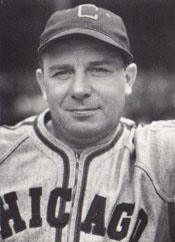
Jimmy Dykes
Back to Top |
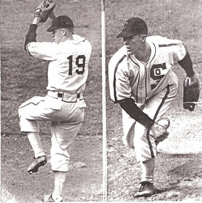
Buck Ross
|
Game 32 - Thursday, June 19, 1941
The Yankees salvaged the finale of the three-game set with the White Sox, 7-2.
- For the first time in six games, Joe had a multi-hit day. He had a single off starter Eddie Smith and another single and a home run off Buck Ross. He scored two and drove in two. A walk topped off his 3-for-3 day that raised his average to .345.
- DiMaggio also displayed his base-running prowess on two occasions. On first in the fourth, he went all the way to third on a single when the LF was a mite slow fielding the ball. In the next inning with Red Rolfe on first, Joe singled into LCF and continued to second on the throw to third.
- Afterwards a reporter asked: "Would you ever bunt to keep you streak going, Joe? The third basemen sure play you deep." DiMag replied: "It just would not do for me to go up there and lay one down deliberately for a bunt to keep a streak going."
The Red Sox gained a split of their four-game series with Detroit, 6-4.
- Williams had a single and a walk with 2 RBIs. He also registered a stolen base.
- The 1-for-3 afternoon lowered his average a point to .416.
Reference: 56: Joe DiMaggio and the Last Magic Number in Sports, Kostya Kennedy (2011) |
Game 33 - Friday, June 20, 1941
Detroit came to the Bronx for a three-game weekend series.
- The Tigers sent their ace, Bobo "Buck" Newsom, to the mound. Some considered the 6'3" 220 lb. righty the second hardest thrower in the league after Feller.
- Be that as it may, he was no match for the Yankees, who pounded him for seven hits and seven runs in 2 2/3 innings on their way to a 14-4 romp.
- Joe slashed a double and three singles off Bobo and his successor, Archie McKain. Joe scored three runs and drove in one.
- The 4-for-5 outburst raised his average to .354, fifth in the league but 66 points behind Williams.
- DiMaggio tied the record for the longest hitting streak by a right-handed batter set by Rogers Hornsby of the Cardinals in 1922.
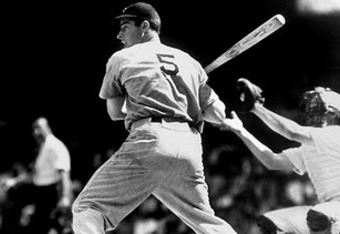
The Browns started a three-game series at Fenway Park.
- Despite being outhit 11-7, the Red Sox prevailed, 4-2.
- Ted hammered a double and a single in three official ABs. He scored a run and drove in 2.
- His average inched up to .420.
|
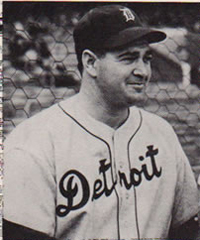
Bobo Newsom
Back to Top |
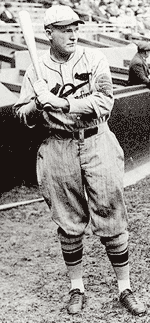
Rogers Hornsby
|
Game 34 - Saturday, June 21, 1941
Joe didn't waste any time extending his streak.
- He came to bat in the first against Dizzy Trout of the Tigers with Red Rolfe on third and two outs.
- DiMaggio lined a single to right to score Rolfe.
- The crowd of 20,067 rose to its feet to cheer the new hitting streak record for a right-handed batter. Rogers Hornsby's standard had stood for 19 years.
- Joe's teammates applauded in the dugout. As usual, the man himself stood stoically at first base.
- The news was transmitted to the press boxes of all the other ball parks that day.
- That was Joe's only hit in four at-bats as Detroit won, 7-2.
The Browns won a 28-hit slugfest over the Red Sox 13-9 in Boston.
- Starter Lefty Grove took the loss, breaking his 20-game winning streak at Fenway Park.
- Williams was 0-for-2 with a walk. His average fell five points to .415.
Born that day: Neal Golden, creator of the Golden Football Rankings
Major event: Germany attacked Russia.
Reference: 56: Joe DiMaggio and the Last Magic Number in Sports, Kostya Kennedy (2011)
Back to Top
|
Game 35 - Sunday, June 22, 1941
The rubber game of the Detroit series attracted 27,072 to Yankee Stadium.
- The Tigers started lanky lefty Hal Newhouser, a future Hall of Famer. Joe had gotten a hit off him in Game 21 of the streak.
- Joe cracked a homer in the sixth to extend the Yankees' major-league record streak of consecutive games with at least one HR to 18.
- DiMaggio also doubled off Bobo Newsom, who relieved in the seventh after lasting less than three innings in his start two days earlier. Bobo walked in the winning run in the ninth as the 5-4 victory kept the Yanks two games behind the Indians.
Meanwhile, the Red Sox split a DH with the Browns at Fenway.
- Boston started fast with six runs in the first and held on to cop the opener 7-5 despite being outhit 16-8.
- Williams went 1-for-3, a single, with a walk, a run, and 2 RBIs.
- The nightcap went to St. Louis 12-3 as the visitors scored 3 in the eighth and 6 in the ninth.
- Ted garnered only a walk in three official at bats to complete a 1-for-6 day that dropped his average to .407, the lowest it had sunk since May 27.
Born that day: 60 Minutes reporter Ed Bradley, actor Michael Lerner
|
Back to Top
|
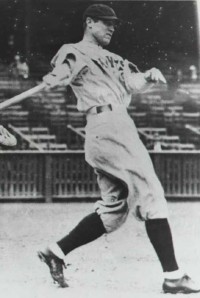
George Sisler
|
Monday, June 23, 1941 - Off Day
The Yankees enjoyed an off day before starting a three-game series with the Browns.
- Having broken Rogers Hornsby's record of 33 straight games with a hit by a right-handed batter, DiMaggio had his sights set on the 41-game streak of George Sisler for the St. Louis Browns in 1922, a year in which the left-handed-hitting 1B batted .420.
- After Game 28 of Joe's streak, the New York Daily News had run an article about Sister's feat. George was quoted: "Sure I'm proud of it. I went through an awful lot to make it. You'd be surprised at the strain a hitter is under ... I tried to forget about the streak but it can't be done. It's in your head every time you step to the plate."
- While Sisler held the record for longest streak since 1903 when the current National/American League setup began (sometimes called "the Modern Era"), the record for longest streak overall was 44 games, set by Wee Willie Keeler of the Baltimore Orioles at the beginning of the 1897 season. (Since Keeler also hit safely in his last game of 1896, historians now credit him with a 45-game streak.)
The Red Sox also had a Monday holiday before hosting the league-leading Indians in a three-game set.
Reference: 56: Joe DiMaggio and the Last Magic Number in Sports, Kostya Kennedy (2011)
Back to Top
|
Game 36 - Tuesday, June 24, 1941
The Yankees began a three-game series with the last-place St. Louis Browns, the last of the four western teams to visit on the current eastern swing.
- Joe's road roommate and best buddy, Lefty Gomez, toed the slab. The Yankees had not lost anyof the five games he had started during The Streak.
- 25-year-old Bob Muncrief, starter in Game 22 of The Streak, took the hill for the visitors.
Winning the game was easy - the Yanks romped 9-1. Extending the streak was another matter.
- Before the game, Joe accepted a small Buddha from the Young Yankees, a team of Chinese boys from Manhattan. They would remember the opportunity to have their picture taken on the field with the great DiMaggio for the rest of their lives.
- For most of the game, it seemed like the good luck charm was a dud.
- DiMaggio grounded out in the first and fouled out to the C in the third.
- Joe crushed one in the fifth to deep LCF, but LF Roy Cullenbine raced long and hard to spear it over his shoulder. In almost any other park, the shot would have been a HR, but it was 457' to the LCF fence at Yankee Stadium.
- That brought Joe to the plate in the seventh for what would probably be his last AB of the afternoon. The crowd of 9,081 chanted, "We want a hit! We want a hit!"
At that point, one of the most interesting events in The Streak occurred.
- Browns manager Luke Sewell, who had taken over the club the first week of June, came to the mound and gave his pitcher a direct order: "Walk him!"
- Shocked, Muncrief asked why. "Because I don't want this son of a bitch to get a base hit."
- Muncrief refused. Sewell threatened to take him out of the game if he didn't.
- Bob replied that he'd walk over and publicly apologize to DiMaggio if Sewell did that. "He doesn't deserve this. Let me get him out."
- Perhaps Sewell understood at that moment the hell he'd have to pay for walking DiMaggio intentionally to stop the streak. He undoubtedly would have needed a police escort to get out of the stadium and would have had to stay in the hotel for the remaining two games of the series. Or he may have realized that his relief pitcher also might refuse to walk Joe. At any rate, he backed off. "Get him out then."
Muncrief tried as hard as he could to end the streak.
- The first pitch, a fastball, tailed inside and almost hit Joe. It nicked the bat for a strike. Muncrief was lucky because hitting Joe, albeit unintentionally, would have brought the public opprobrium onto his head, not Sewell's. (Could a player refuse to take his base when hit and insist on continuing his at-bat?)
- The second delivery was also inside for a ball.
- With the crowd chanting relentlessly, Joe lined a curveball over the head of the SS into the outfield. 36 in a row!
- The Yankees jumped to the top step of the dugout cheering their teammate and rattling the bats in the rack.
- Even though the score was only 4-1 at that point but with Joe's streak intact, most of the crowd left.
Nothing nearly as dramatic happened in Boston where the Red Sox pasted the Indians 13-2.
- The defeat moved the Yankees only one game behind Cleveland.
- Ted Williams didn't contribute any of the 18 hits but walked three times in two official ABs. His average fell further to .403.
Reference: 56: Joe DiMaggio and the Last Magic Number in Sports, Kostya Kennedy (2011)
|
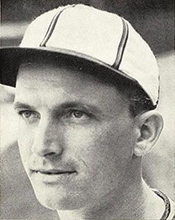
Bob Muncrief
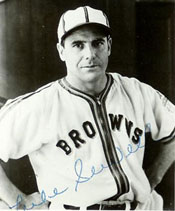
Luke Sewell
Back to Top |
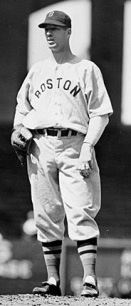
Lefty Grove
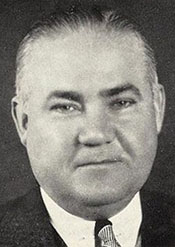
Donald Barnes
Back to Top |
Game 37 - Wednesday, June 25, 1941
The Yankees pulled into a virtual first place tie with Cleveland by beating the Browns 7-5 while the Red Sox took care of the Indians, 7-2.
- DiMaggio lined a fourth-inning HR off Denny Galehouse into the LF seats to extend his streak. It was Joe's only hit in four ABs.
- Galehouse's name would become intertwined in baseball history with that of Yankee manager Joe McCarthy seven years later when Joe, managing Boston, chose Galehouse rather than rookie Mel Parnell to start the one-game playoff with Cleveland for the AL pennant. The Indians jumped all over Denny to take the game 8-3 and go on to win the 1948 World Series.
The Red Sox broke open a tie game with 5 in the seventh at Fenway.
- Williams broke out of his mini-slump with a HR and single in 3 ABs to raise his average to .407. He had a W, 2 R, and 2 RBIs.
- Lefty Grove won his 298th game. It was well known that he still toiled at age 41 in order to reach the coveted 300 plateau. He would win two more that season before an injury caused his retirement.
The big doings in the American League that summer were going on outside the public eye and involved the Browns.
- Tired of decades of worse-than-mediocre teams playing second fiddle to the Cardinals in the Mound City, Browns president Donald Barnes worked out the outline of a deal to move the franchise to Los Angeles for the 1942 season.
- The plan called for the Browns to purchase the Los Angeles Angels from Cubs' owner Philip Wrigley. The Angels would move to Long Beach, and the Browns would play in the Angels' ballpark, called Wrigley Field like its Chicago counterpart. Another part of the agreement called for Cardinals owner Sam Breadon to pay the Browns $250,000 to leave Sportsman's Park to his team.
- The other AL owners gave a tentative okay for negotiations to move forward. Their main concern was transportation, especially airline flights over the Rockies. Several passenger planes had crashed in mountainous terrain. So afraid were the owners of losing an entire team that their preliminary plans, worked out with TWA over the next few months, called for splitting clubs on two staggered flights to the West Coast.
- Eventually, AL officials scheduled a meeting with TWA to finalize travel plans preparatory to announcing the Browns' move. The meeting was scheduled for December 7, 1941.
- Well, we all know what happened that day. The Japanese attack on Pearl Harbor propelled the U.S. into World War II and created fears of a West Coast invasion. This was no time to relocate a team to California.
- The Browns scrapped the idea. While they did win their only AL pennant in 1944, they moved to Baltimore following the 1953 season. Los Angeles would get an NL team, the Brooklyn Dodgers, in 1958 and an AL expansion franchise, the Angels, in 1961.
Reference: Ted Williams: A Baseball Life, Michael Seidel (1991)
|
Game 38 - Thursday, June 26, 1941
As in the first game of the Browns series two days earlier, DiMaggio went to his last at-bat without a hit. And like the other game, an interesting byplay took place before he stepped to the plate for his final chance.
- Facing Elden Auker for the third time during the streak, Joe was 0-for-3. He flied to left in the second, then hit a "brisk ground ball" that SS Johnny Berardino couldn't handle in the fourth. Unlike Game 30 when he granted Joe a hit on a ball that took a bad hop, official scorer Dan Daniel ruled it an error to the displeasure of the Yankee bench. Joe, who didn't like Auker's submarine delivery, grounded out weakly in the sixth.
- As the Yanks came to bat in the bottom of the eighth leading 3-1, they knew there probably would be no bottom of the ninth. Lefty Marius Russo was mowing down the Browns, taking a no-hitter into the eighth before 1B George McQuinn homered into the RF stands.
- With DiMaggio due to hit fourth in the inning, someone had to reach base to give him another shot.
- Rarely in baseball does the 1B bat leadoff, but McCarthy regularly put Johnny Sturm in that spot. However, he went out to start the eighth.
- Red Rolfe then drew a walk to the delight of the crowd of 8,692 who rose and cheered as if he had homered.
- That brought RF Tommy Henrich to the plate. DiMaggio moved on deck.
Sizing up the situation, Henrich called time.
- He took a few steps toward the Yankees 3B dugout and asked the manager, "Be all right if I bunted here, Joe?"
- McCarthy quickly divined Henrich's thinking. Above all, he must not hit into a double play. So the skipper nodded assent.
- On his second try, Tommy bunted fair and was thrown out at first.
- Many Yankees feared the Browns would walk Joe intentionally with 1B open. Some may have figured out what transpired in the conversation between Manager Luke Sewell and P Bob Muncrief two days earlier when Muncrief refused to walk Joe in his last AB.
- However, Auker had no intention of walking "the Big Dago." Elden felt good about his chances of handling Joe again and, like any hurler in his shoes, wanted a place in history as the guy who stopped the Mighty DiMaggio's streak.
- Also, the Browns were down only two runs. Why put a second man on base and bring up another power hitter, Charlie Keller, a lefty who would not be as bothered by Auker's delivery?
When it became clear that Elden would pitch to Joe, the Yankees moved to the front of the dugout.
- Auker wound up, bent over, and threw an underhanded curveball.
- Joe smashed a liner over 3B Harlond Clift's head into the LF corner. Rolfe scored easily as Joe pulled into second.
- The Yanks continued their new tradition of rattling the bats in the rack when their hero extended his streak.
Russo set down St. Louis in order in the ninth.
- His one-hitter in which he faced only 28 batters was overshadowed by The Streak. Marius walked two, but one was erased in a DP and the other caught stealing.
- Fans jumped onto the field and ran toward Joe as he came in from CF with one hand on his cap. They slapped him on the back and shouted their congratulations.
The Indians outscored the Red Sox 11-8 to remain in a virtual tie for first, .006 behind New York.
- Bob Feller improved his record to 16-3 despite yielding 11 hits and 8 runs in 7 2/3 innings.
- Williams, who followed The Streak closely and rooted for Joe like everyone else, had three singles in 5 AB to raise his average to .412.
The Yankees departed for a brief road trip: two games at Philadelphia and two at Washington. Would The Streak still be alive when they returned?
Major event that day: Finland entered the war against Russia.
Reference: 56: Joe DiMaggio and the Last Magic Number in Sports, Kostya Kennedy (2011)
|
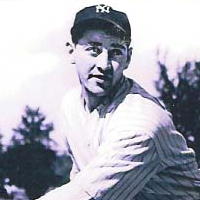
Marius Russo
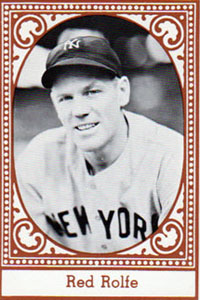
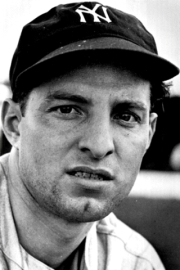
Tommy Henrich
Back to Top |
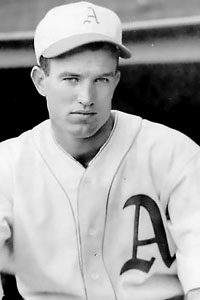
Chubby Dean
|
Game 39 - Friday, June 27, 1941
Joe wasted no time putting his mind to rest in his first game against Connie Mack's Philadelphia A's during the streak.
- He hit the first pitch he saw from Chubby Dean for a single.
- DiMaggio later cracked a homer over 450' to finish 2-for-3.
- The Yanks, however, lost 7-6 to fall back to second place, a game behind Cleveland.
The Red Sox were on a tandem road trip, playing at Washington for two days before swapping opponents with the Yankees.
- A surprisingly good Friday afternoon crowd of 18,500 saw their Senators defeat Boston 5-3.
- Williams was 1-for-3 with a W, dropping his average slightly to .411.
Back to Top
|
Game 40 - Saturday, June 28, 1941
The A's started righty Johnny Babich, a native of Richmond CA near Joe's hometown of San Francisco.
- Babich had played on the San Francisco Seals with Vince DiMaggio before spending two undistinguished seasons (14-25 record) with the Brooklyn Dodgers.
- Johnny spent 1938 in the Yankees farm system before being drafted by the A's in the off-season.
- Babich had beaten the Yankees five times in six games during the 1940 season to help keep them from their fifth straight World Series.
- The brash A's hurler bragged to teammates that he had a plan to stop DiMaggio's streak. He would get Joe out his first time up. Then he would walk him the rest of the game. Since there are no secrets in baseball, the Yankees heard about his boast, in part because some Athletics didn't approve of their teammate's strategy.
13,604 fans showed up at Shibe Park, more than twice the average weekend crowd for the sixth-place A's, to see if Babich could end the streak.
- DiMaggio just missed a double in his first AB, pulling a liner that landed inches outside the foul line. On the next pitch, he popped out to SS. Babich had completed the first step of his plan.
- When Joe came to the plate in the third, Johnny threw three straight wide ones, obviously carrying out his plan.
- Joe, who had no use for Babich or his scheme, stepped out to check with 3B coach Artie Fletcher. As he expected, he got the hit sign.
- Babich tried to throw another one high and outside but didn't get it far enough off the plate. Joe reached out and smashed the ball through the box, the P falling down as he tried to get out of the way.
- DiMaggio never stopped rounding first and roared into 2B with a double. Joe later remembered that Babich "was as white as a sheet" and called the double "the most satisfying hit of the streak."
- Joe got a single off reliever Lumen Harris to finish 2-for-5 as the Yanks won 7-4 to pull back into a first place tie with Cleveland, which lost to the White Sox.
- Charlie Keller's HR extended New York's record streak to 23 straight games.
After the game, Joe received a telegram informing him that a 10-year-old boy dying from a spleen disease at Jefferson Hospital wanted to meet him.
- With the Yankees willing to delay their departure for Washington, Joe and Lefty Gomez went to the hospital.
- Joe talked with the boy for awhile and found out he had listened to the game on the radio and had been following his streak.
- Joe promised he would keep the boy in mind during the Sunday doubleheader against the Senators.
The Red Sox lost their second straight to the Senators, 3-1.
- Williams went 1-for-3 again with a walk but grounded into two DPs.
- .333 for the game lowered his average another point to .410.
Reference: 56: Joe DiMaggio and the Last Magic Number in Sports, Kostya Kennedy (2011)
|

Johnny Babaich
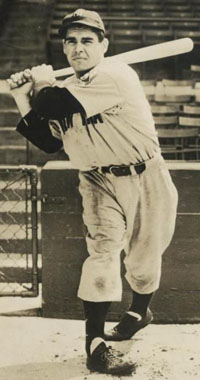
Charlie Keller
Back to Top |
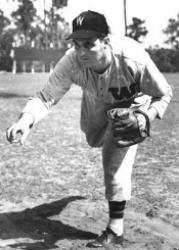
Dutch Leonard
|
Game 41 - Sunday, June 29, 1941 - Game One
The Yankees came to Washington for a quick one-day series consisting of a Sunday doubleheader.
- An overflow crowd of 31,000, undoubtedly drawn by The Streak, braved the 98° heat. Many more fans were turned away.
- The last time the Yankees played in Griffith Stadium, Game 14 of The Streak, only 1,500 attended on a weekday.
- If DiMaggio got a hit in each game, he would break George Sisler's 41-game streak of 1922 for the St. Louis Browns.
- Joe would face the Senators two best hurlers: Dutch Leonard and Sid Hudson, victim in Game 13.
As an indication of the nationwide interest in The Streak, the broadcast of the game was transmitted to many cities.
- Sisler, still living in St. Louis, listened in.
- Out in San Francisco, Joe's father, Giuseppe, couldn't hear the games but kept the radio on all day because bulletins were flashed coast-to-coast concerning his son's progress. And fans could call the local newspaper office to ask what they had picked up off the wire service reports.
- At the ballpark, a large group of photographers knelt along both foul lines, as close to the action as the umpires would permit. Motion picture cameras also captued each DiMaggio at-bat for the newsreels.
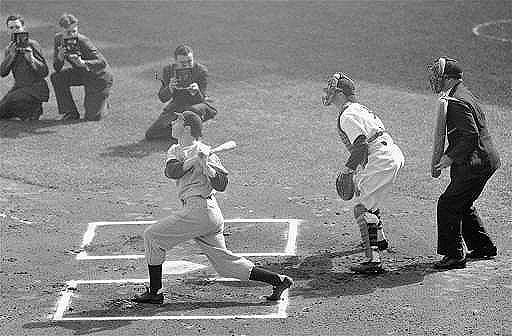
Game One
- Dutch Leonard was 32 and showed his age as indicated by the nicknames opponents called him, "butcher boy" and "big blubber." His signature pitch was a knuckleball, thrown from "a big, jerky windup." His fastball wasn't that great but, after a diet of knuckleballs, sneaked past the hitter. DiMaggio described Leonard's fastball as one of the trickiest in the AL.
- Joe hit the first pitch high into CF, bringing the crowd to its feet. But Doc Cramer ran over and caught it easily.
- In the fourth inning, Leonard moved the ball around but not in the strike zone. With the count 3 and 0, DiMaggio looked to 3B Coach Fletcher. McCarthy once more went against his normal rule and gave the hit sign. Joe probably should have taken the next pitch but instead popped up to 3B to the groans of the fans.
- The Yankees led 3-0 as Joe faced the laboring Leonard in the sixth. He swung and missed, then took a curve for ball one. Dutch tried a fast ball knee high on the outside corner. That was like trying to sneak the sunrise past a rooster. Joe smacked it to the LCF wall for a stand-up double. The fans stood and cheered as did the Yankee dugout.
- Joe finished the game 1-for-4 with a hit by pitch as the Yanks romped 9-4. His hit guaranteed that the crowd would stick around for the nightcap.
Between games, DiMaggio peeled off his soaked uniform, took a shower, and donned fresh flannels.
- Reporters couldn't wait for the end of the second game to ask questions about the double. So he said a few words about the at-bat.
- McCarthy: "Joe didn't need any help from. But don't forget we got another ball game in a few minutes."
- When DiMaggio returned to the dugout, he discovered that someone had stolen his bat!
Reference: 56: Joe DiMaggio and the Last Magic Number in Sports, Kostya Kennedy (2011)
Previous Games |
Game 42 - Sunday, June 29, 1941 - Game Two
Joe's first thought was that Tommy Henrich had his bat.
-
After all, Tommy had been using a DiMaggio model he'd borrowed several weeks ago.
-
Henrich, preparing to hit in the first inning of the second game, said he didn't have the bat that Joe had sanded down to his liking the last few weeks.
-
A search of the bat rack and the dugout didn't turn up the precious war club.
So Joe grabbed one of his backup bats to face Sid Hudson in the first inning.
- The righty fired a waist-high fastball that Joe looped into RF Buddy Lewis's glove.
- In the third, Hudson delivered a sidearm curveball that Joe lined straight to SS Cecil Travis.
- Joe faced a new P in the fifth, 6'3" 210 lb righthander Arnold "Red" Anderson, in a 4-4 game. With a favorable count of 2-0, Joe swung at an inside fastball and hit a "dying quail" to Cramer in CF.
- Not that it mattered much to the fans, but the Yankees took the lead 6-4 in the top of the sixth.
- Unlike most players, Joe sat impassively on the bench staring at the field. You couldn't tell from his demeanor whether he was 0-for-3 or 3-for-3. His teammates studiously avoided him.
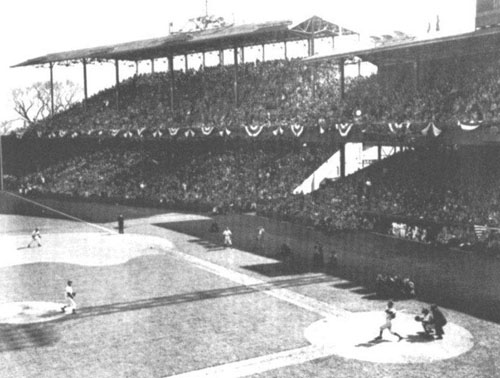
A packed Griffith Stadium - date unknown
Before DiMag stepped to the plate in the seventh for what might be his last AB of the game, Henrich suggested he use the bat that had served Tommy well the last few weeks. Joe agreed.
- Red threw a fastball high and inside for ball one. When he fired another hard one over the plate, Joe smacked a clean single into LF. The roar of the crowd radiated throughout the residential neighborhood and beyond. The Yankees threw caps in the air and danced in the dugout.
- 1B coach Earle Combs slapped Joe on the back, and 1B Mickey Vernon shook his hand. Even 1B umpire Bill McGowan came over and gave the guy who just passed Sisler a pat on the rear. Observers even detected a brief smile on Joe's face, perhaps as much an expression of relief as of joy. Children ran onto the field, and it took several minutes for the bedlam to subside and the game to resume.
- When the next batter, Charlie Keller, tripled Joe home, he received a hero's welcome as he reached the dugout. All his teammates hugged him and clapped him on the back. Even manager McCarthy, usually as stoic during games as his CF, sported a broad grin. (Once, when asked if DiMaggio could bunt, McCarthy replied, "I'll never know.")
- Joe finished the 7-5 Yankee victory with 1-for-5. He had only one hit in each game of the doubleheader, but that's all he needed.
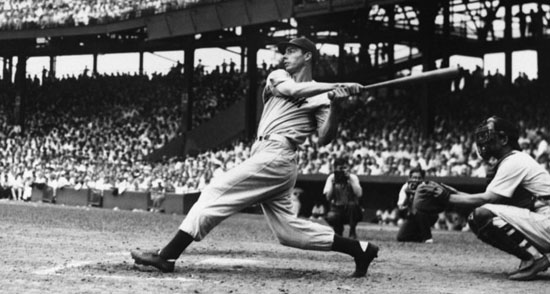
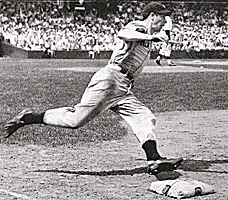
DiMaggio rounding first after breaking Sisler's record
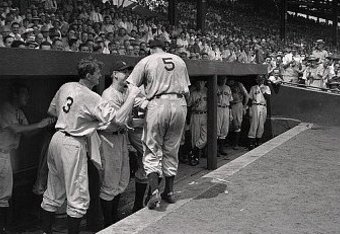
DiMaggio reaches dugout after historic hit - note the soaked uniforms
The congratulations continued afterwards
-
McCarthy, still smiling, shook Joe's hand and wouldn't let go. No words were necessary. DiMaggio was grateful that "Marse Joe" had bent his usual strategies several times to accomodate The Streak.
-
A telegram arrived from George Sisler: "Congratulations. I'm glad a real hitter broke it. Keep going."
-
Facing the press, Joe said, "Sure Im tickled, who wouldn't be? It's a great thing ... When I got close to Sisler's mark, I didn't want to stop. I never felt so much on the spot before ... It is the most excitement I guess I've known since I came into the majors."
-
Joe admitted: "I never really was concerned about the mark until around the 33rd game. Yesterday, in Philadelphia, for the first time I was really nervous. I was tense out there today, too."
-
The extension of The Streak made the hourly news spots across the country alongside the war reports from Europe.
-
Everyone assumed Joe had broken the modern hitting streak record. Only he hadn't as it turned out.
In Cleveland, the Indians dropped two to the White Sox. The Yankees led the league by 1 1/2 games. They would remain in first place for the rest of the season.
The Red Sox split a doubleheader in Philadelphia.
- Boston lambasted the A's 13-1 in the opener. Williams had a HR and single in 4 ABs.
- Jack Knott quieted the Sox bats as Philly grabbed the nightcap 3-2. Ted went 0-for-4.
- Williams' average was still four points over .400 as the season neared the All-Star break. Few noticed because the spotlight was on DiMaggio.
- The next Sunday doubleheader Ted would play in The City of Brotherly Love would be the last day of the season with his .400 average on the line.
Born that day: Activist Stokley Carmichael
Died that day: Polish pianist/statesman Igance Paderewski
Reference: 56: Joe DiMaggio and the Last Magic Number in Sports, Kostya Kennedy (2011)
|
Back to Top |
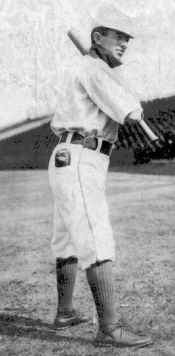
Willie Keeler
|
Monday, June 30, 1941 - Off Day
The Yankees returned to New York to enjoy a day off before beginning a six-game homestand prior to another western swing after the All-Star break.
- The Streak continued to dominate the sports pages despite the idle day because research had determined that Joe had not set the record for longest hitting streak even though The Washington Post ran a Monday morning headline, DIMAGGIO SETS CONSECUTIVE HITTING MARK.
- Baseball historians determined that Wee Willie Keeler hit safely in 44 consecutive games for the Baltimore Orioles in 1897. That was now proclaimed the "modern record."
- As a result, the headline in one of the New York newspapers proclaimed, "DIMAGGIO WILL AIM FOR ALL-TIME HITTING RECORD" in the doubleheader against the Red Sox on Tuesday.
- A spate of articles on Keeler pointed out that he stood only 5-5 and weighed a mere 140 lbs. He swung a 30.5 ounce bat that was only 30 1/2 inches long. He choked up on the handle six inches and "hit 'em where they ain't," to quote his own description of his hitting style.
- Commentators opined that hitting was harder in Willie's day for many reasons. The baseball wasn't as lively, and a ball stayed in play despite scuffs and dirt. Furthermore, pitchers legally applied spit, tobacco juice, and other substances to make the horsehide break more.
- However, that argument ignored one salient fact from the 1897 rules: Foul balls didn't count as strikes. Keeler was adept at fouling off pitches that he didn't want, wearing the P down until he delivered one to Willie's liking.
Joe's brother Dominick saw the headline about the all-time hitting record when he arrived from Philadelphia.
- Dom hadn't spoken to Joe in weeks but of course had followed The Streak.
- When Dom called his father in San Francisco, Giuseppe would inevitably turn the conversation to Joe's accomplishment.
- The younger DiMaggio was having a good year himself, batting .321 in the leadoff spot. He was selected to the All-Star team as a reserve.
- When Boston played at home, LF Ted Williams had an agreement with the scoreboard operator inside the "Green Monster" to alert him when Joe got a hit. Ted would relay the news to Dom.
- Williams compiled a 23-game hitting streak that started before Joe's and ended on June 8, but no one paid any attention. It would turn out to be the longest of Ted's career, in large measure because he took walks rather than swing at pitches out of the strike zone. He would compile what is believed to be history's longest streak of consecutive games reaching base safely with 84 in 1949. (DiMaggio's hitting streak was part of a 74 game on-base sequence.)
An editorial that day in The New York Herald Tribune said:
The question on every baseball fan's lips was, "Did DiMaggio get a hit today?" Even hardened big league pitchers "warming up" in the bull pen ceased their throwing when the great "DiMag" came to bat, to turn and watch him, wondering if he could possibly equal this amazing skein - a record which had escaped such hitting stars of all time as Ty Cobb, Babe Ruth, Rogers Hornsby and Lou Gehrig.
Reference: 56: Joe DiMaggio and the Last Magic Number in Sports, Kostya Kennedy (2011)
Back to Top |
|
Noteworthy Games
Game 30 - Controversial Scorer's Call
Game 34 - Joe Breaks Hornsby's Record
Game 36 - Muncrief Refuses to Walk Joe
Game 38 - Henrich Sacrifices for Joe
Game 40 - "The Most Satisfying Hit of the Streak"
Game 41 - Joe Ties Sisler
Game 42 - Henrich Lends His Bat
Games 1-11
Games 12-26
Games 43-56
Baseball Magazine
Golden Rankings Home |




























